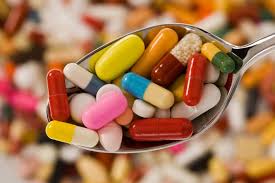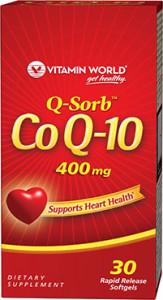 Antioxidants are substances, often vitamins and minerals, which are important in the fight against the damaging effects of free radicals. Antioxidants work by binding with the free radical molecules, naturally produced in the body through metabolism and energy production. Because the antioxidants bind to the free radicals they do not allow these molecules to do further damage to cells. Free radical damage has been linked to heart disease, coronary artery disease, and peripheral vascular disease to name just a few. (1,2)
Antioxidants are substances, often vitamins and minerals, which are important in the fight against the damaging effects of free radicals. Antioxidants work by binding with the free radical molecules, naturally produced in the body through metabolism and energy production. Because the antioxidants bind to the free radicals they do not allow these molecules to do further damage to cells. Free radical damage has been linked to heart disease, coronary artery disease, and peripheral vascular disease to name just a few. (1,2)
Coenzyme Q10 is one of those antioxidants important in the function of the heart muscle. It is produced by the body and necessary for the basic functioning of many cells. Researchers now believe that these levels will decrease with age and will also be particularly low in individuals who have certain chronic diseases such as heart conditions, muscular dystrophy, Parkinson’s disease, cancer and diabetes. (3)
Coenzyme Q10 was originally discovered in 1957. It is known to help the mitochondria produce power and energy in the process of transforming food. It is also found to be beneficial in a surprising number of health problems.
Almost every cell in the human body contains this coenzyme. The majority of it is stored in the mitochondria of the cells where energy is produced. Because the heart and liver contain the most mitochondria per cell they also have the greatest amount of Coenzyme Q10.
One health condition which this coenzyme appears to help significantly is periodontal disease, which has also been linked to a deficiency of Coenzyme Q10. Researchers, using double blind studies, have found that people with periodontal disease who were given supplementation would achieve better results than those who were given a placebo. (4)
Coenzyme Q10 can become deficient when individuals take specific types of drugs, especially those who use statin drugs in order to lower cholesterol. Other oral medications to reduce blood sugar can also decrease the serum levels of Coenzyme Q10 and reduce the effects of supplementation. These drugs, both the statins and the oral hypoglycemic drugs, inhibit the production of the coenzyme and cause serious complications unless supplementation is introduced back in to the diet.
References:
(1) Basic Research in Cardiology: Coronary artery disease–free radical damage, antioxidant protection and the role of homocysteine
http://www.ncbi.nlm.nih.gov/pubmed/11192356
(2) Cardiovascular Research: The Role of Oxidants and Free Radical in Reperfusion Injury
http://cardiovascres.oxfordjournals.org/content/70/2/181.full
(3) American Family Physician: Coenzyme Q10
http://www.aafp.org/afp/2005/0915/p1065.html
(4) University of Maryland Medical Center: Coenzyme Q10
http://www.umm.edu/altmed/articles/coenzyme-q10-000295.htm
(5) Linus Pauling Institute: Coenzyme Q10
http://lpi.oregonstate.edu/infocenter/othernuts/coq10/
(6) University of California SanDiego: Preliminary Study Shows High-Dose Coenzyme Q10 Slows Functional Deline in Parkinson’s Disease Patients
http://ucsdnews.ucsd.edu/newsrel/health/101402Schults.htm
(7) University of Maryland Medical Center: Coenzyme Q10
http://www.umm.edu/altmed/articles/coenzyme-q10-000295.htm
| Advertisement | |
 |
|


Leave a Reply